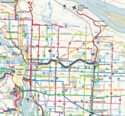Washington's Metro (subway), often called "America's subway," may well be America's embarrassment. As a feature article by Robert McCartney and Paul Duggan in the Washington Post put it: “'America’s subway,' which opened in 1976 to great acclaim — promoted as a marvel of modern transit technology and design — has been reduced to an embarrassment, scorned and ridiculed from station platforms to the halls of Congress. Balky and unreliable on its best days, and hazardous, even deadly, on its worst, Metrorail is in crisis, losing riders and revenue and exhausting public confidence." (emphasis by author.) read more »
Transportation
America's Subway: America's Embarrassment?
- Login to post comments
A Commentary on the Notion of Extreme Commutes
A recent piece by Joe Cortright in the City Observatory touched on the often discussed issue of extreme commutes, a favored topic among reporters complaining about sprawl and traffic congestion. The notion of extreme commutes is obviously a fun topic. But it is one that is ripe for analysis based on travel time data that has been available through the Census since 1980 . read more »
- Login to post comments
Evolving California High Speed Rail Now Degraded To Only A Commuter Train
When voters passed in the November 2008 election, Prop 1A, they approved partially funding a 800 mile High Speed Rail project, that was to run from San Francisco to San Diego. The project was to be constructed quickly and be up and running by 2020.
Approved Business plans in 2012 and 2014, then projected construction to start from the Central Valley, near Fresno, and proceeding south through the Tehachapi Mountains to Los Angeles Union Station. read more »
- Login to post comments
In Praise of Plain Old Bus Service
My recent post on counting the long term costs of building rail transit got a lot of hits – and as expected a lot of pushback.
There are a lot of people out there that are simply committed to the idea of rail transit, no matter how unwarranted a particular line or system might be. read more »
Why You Should Think Twice Before Building a Rail Transit System
The Washington Metro system was shut down completely for a day recently to allow crews to inspect all of the power cables in the system. They found 26 cables and connectors in need of immediate repair.
This is just the latest in a series of safety problems and breakdowns that have plagued the system.
Metro has a large unfunded maintenance liability. This doesn’t surprise us because we expect American transit systems to have a backlog. read more »
- Login to post comments
Mass Transit Expansion Goes Off The Rails In Many U.S. Cities
Journalists in older cities like New York, Boston or San Francisco may see the role of rail transit as critical to a functioning modern city. In reality, rail transit has been a financial and policy failure outside of a handful of cities. read more »
What Price Urban Density?
We regularly hear the argument that living in a compact city is more affordable than living in one that is more spread out. But what does the data actually show about the cost of housing in compact cities, and the cost of transport in these dense places? The relationship between those two expenses and the compactness of a city could tell us much about which kinds of places are most affordable, since those two costs together dominate household budgets. read more »
- Login to post comments
Just How Much has Los Angeles Transit Ridership Fallen?
Los Angeles transit ridership has fallen even more than a recent Los Angeles Times front page story indicated, according to Thomas A. read more »
- Login to post comments
Intercity Buses: 2015 Was A Smooth Ride
As a former airline pricing analyst who once viewed the intercity bus as an inconsequential player in major markets, I am perhaps an unlikely champion of this mode’s potential. But since Megabus made its US debut just blocks from my Chicago office in 2006, I have become intrigued with this increasingly popular mode of intercity transportation. read more »
- Login to post comments
Discount Airlines: The Cheap Seats Challenge
Market forces in the airline business are, for the moment, a battle between state-owned carriers like Alitalia and Aeroflot, and start-up discounters like Ryanair and AirAsia. The conflict between state monopolies and under-capitalized start-ups is a perfect metaphor for the economic debates over subsidies and competition that divide much of the industrial world in America, Europe, and Asia. When my dreams come true, carriers like these will encircle the globe with two-hour, $49 short-hop flights. read more »
- Login to post comments





















